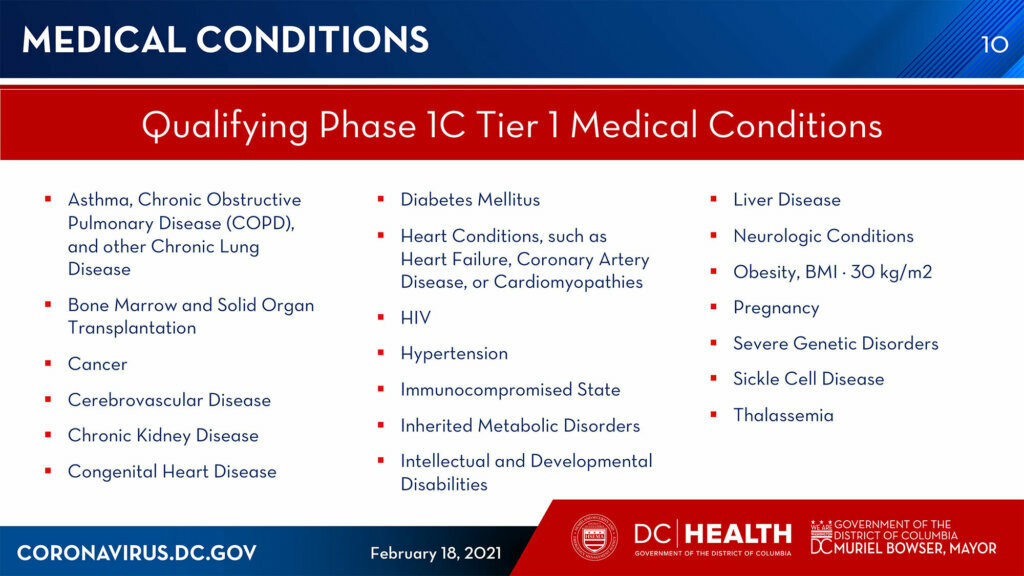
D.C. plans to open COVID-19 vaccine appointments to a much larger segment of the population starting in March, according to officials on Thursday.
The new guidelines state that on March 1, D.C. will start the first tier of Phase 1c, which will cover residents age 16 to 64 with specific medical conditions.
The update comes as part of the “science-driven approach” the District is taking toward vaccinations, D.C. Health Director Dr. LaQuandra Nesbitt said.
“The list that the CDC (Centers for Disease Control and Prevention) publishes is based on what scientific evidence exists, based on the type of studies that have been done today, or what’s called a ‘meta analysis’ of review of literature, or review of data sets,” Nesbitt said.
For example, Nesbitt said the District could “miss the opportunity” to vaccinate individuals who are age 50 or older, or individuals who have sickle cell anemia.
“The same thing, phenomenon, occurs with individuals with HIV,” Nesbitt said. “When we looked at the data in terms of overweight, obesity and smoking in the communities that are disproportionately impacted in the District, it actually is such that obesity tends to be more prevalent than overweight in some of those communities, and so we believe we can still cover that population with obesity, and then smoking in those populations tends to be a behavior that is associated with these health conditions.”
Nesbitt said people will need to “self-attest” when they register for an appointment. “So there is no need for a person who registers for an appointment through the portal to have any documentation from their health care provider,” she said.
Conditions not included on the list will not be considered, according to Nesbitt.
D.C. remains in Phase Two of its pandemic reopening plan.
What about federal workers?
The hopes of regional leaders to get COVID-19 vaccine doses specifically allocated for the federal workforce have so far been dashed.
Mike Ricci, with Maryland Gov. Larry Hogan’s office, said that the Federal Emergency Management Agency verbally denied the request made by Hogan, Virginia Gov. Ralph Northam and D.C. Mayor Muriel Bowser made in a letter to federal officials last week.
The allotment would have freed up existing vaccine doses coming into D.C., Maryland and Virginia to move forward with giving shots to those who do not work for the federal government, while ensuring the distribution to federal workers would be covered.
Ricci said there was no formal denial letter, but added that it was clear the request won’t go forward.
Alena Yarmosky, with Northam’s office, said they were “disappointed” that FEMA denied the joint request, but that Northam will continue to work closely with the Biden administration and with regional partners as vaccinations continue.
In response to a reporter’s question on the region’s request during the news conference Thursday, Chris Rodriguez, director of D.C.’s Homeland Security and Emergency Management, said, “FEMA has not responded in writing, but we’ve been told that our request will not be approved.”
When asked about vaccination plans for postal workers, who would’ve been included in the request for federal employees, Bowser said, “We are optimistic that with some ongoing decisions with FEMA that the request we have not yet received in writing can be different than the informal response that we’ve received.”
“We’re optimistic that we can continue to keep the dialogue and discussions going with FEMA and get a different decision about how we will approach federal workers with a supplemental supply of vaccine into the District for the federal workforce,” Bowser said.
Later Thursday, congressional leaders representing parts of the region sent a letter to Office of Personnel Management Acting Director Kathleen McGettigan and CDC Director Rochelle Walensky, also requesting dedicated vaccine doses for the federal workforce.
“The National Capital Region is home to the largest concentration of federal employees, and these workers often qualify as essential workers. That means that Virginia, D.C., and Maryland have a disproportionate number of individuals classified as essential workers by the federal government, yet the responsibility of vaccination falls under these subfederal jurisdictions,” the letter reads.
“Rather than foisting federal employees onto Virginia, D.C., or Maryland’s supply of vaccines and increasing their essential worker vaccination responsibilities, the federal government should vaccinate federal employees through a separate federalized allocation to get them vaccinated as soon as possible.”
The letter is signed by Reps. Don Beyer, D-Va.; Gerry Connolly, D-Va.; Anthony Brown, D-Md.; Jamie Raskin, D-Md.; Jennifer Wexton, D-Va., and David Trone, D-Md.; and Del. Eleanor Holmes Norton, D-D.C. Read the full letter here.
WTOP’s Teta Alim contributed to this report.
- Sign up for WTOP alerts
- Latest coronavirus test results in DC, Maryland and Virginia
- Coronavirus vaccine FAQ: What you need to know
- Latest vaccination numbers in DC, Maryland and Virginia
- Experts warn against COVID-19 variants as states reopen
- DC opens up COVID-19 vaccinations to grocery store workers, more
- Virginia launches call center to help with vaccination preregistration
- Some seniors frustrated with new Md. vaccine appointment call center
Looking for more information? D.C., Maryland and Virginia are each releasing more data every day. Visit their official sites here: Virginia | Maryland | D.C.









